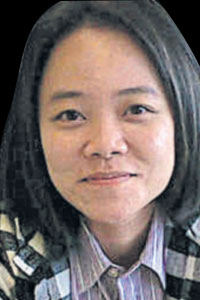It has been a while since the second season finale of the TV hit Hormones The Series, but it seems the hormones are still running rampant.
This time, though, the mischievousness is not televised.
Stars from Hormones The Series were recently in Japan, where four actors and actresses were filmed dancing like crazy on a subway, with unamused Japanese commuters looking on in shock and bewilderment. In a separate incident, a few of the stars were seen bending branches of cherry blossom trees towards themselves as they tried to take photos during the country's cherry blossom festival.
Thanks to the power and speediness of social networks, the subway video clip (which runs less than a minute) and cherry blossom photos were quickly available online. In fact, it was one of the trip's participants — Sutatta Udomsilp — who posted the clip on her Instagram. Sutatta, giggling, filmed the ill-suited dance herself.
The behaviours of the young heartthrobs were harshly criticised as extremely inappropriate, especially in the Land of the Rising Sun, whose people place much importance on public etiquette.
The Japanese take manners very seriously, and have unspoken rules regarding etiquette that govern everything from bathing, bowing, giving business cards and making payments in supermarkets to using chopsticks and drinking tea.
Of course, such an incident was not a matter of life and death, nor huge enough to disrupt Thailand's diplomatic relations with Japan. Neither did it trigger official comment from Japanese authorities. At least not yet. It has, however, stirred a hot public debate among Thai netizens as to appropriate tourist behaviour.
Akihiro Tomikawa, better known as Koki Aki, who earlier this year posted a complaint about the Suvarnabhumi airport taxi service on his Facebook, shared the dancing video clip as well, with captions urging Thais to have more awareness regarding Japanese etiquette. As a native of Japan who lives, works and operates charitable projects for slum children in Thailand, Tomikawa, after seeing the clip, said he was worried such improper public behaviour would shed a negative light on Thailand, and cause the Japanese to hold negative attitudes toward Thais. As a Japanese man who loves Thai people, as he puts it, the businessman also said he was sorry for what happened.
As Thais, we not only feel sorry; we feel ashamed, petrified, guilty and responsible. After the clip went viral and received negative feedback, Sutatta was quick to apologise. The clip was deleted. The stars who were seen dancing in the clip also apologised. All of them expressed their guilt and said they would accept any punishments.
Songyos Sugmakanan, the director of Hormones The Series, also apologised. GTH, the production company behind the series, posted a message on its Facebook page stating that the company would take action in response to the rowdy public misconduct.
The apologetic response from those concerned was, of course, an act of good manners. But if these Hormones stars had taken public decorum more sincerely and seriously, this would not have happened in the first place.
Social behaviour is important everywhere. Cultural differences are inevitable on a journey to a land full of strangers, but if we visit any country that is not our own, we must educate ourselves to the point that we understand its culture to a certain extent and behave accordingly.
Reading travel guidebooks and finding what to eat and where to shop is not enough. We must learn what the local people do, how they behave as well as certain things that are forbidden in the place we are to visit.
In November, the Royal Thai Embassy in Tokyo posted on its Facebook page a long guide to Japanese etiquette, especially for Thai travellers. This included the use of escalators, the use of mobile phones on public transportation, queuing, garbage sorting and so forth. Two weeks ago, the Embassy also posted a list of "dos and don'ts" for Thais during the cherry blossom festival. These posts are perhaps a sign foreseeing and simultaneously hoping to prevent disgraceful behaviour from taking place.
This naughty dancing incident reminds us it's about time that we — regardless of age, education, occupation and nationality — take this issue more seriously, and that Thais should stop criticising Chinese tourists for unacceptable public behaviour.
At the end of the day, after all, Thais are guilty, too.
Arusa Pisuthipan is the deputy editor of the Life section of the Bangkok Post.
